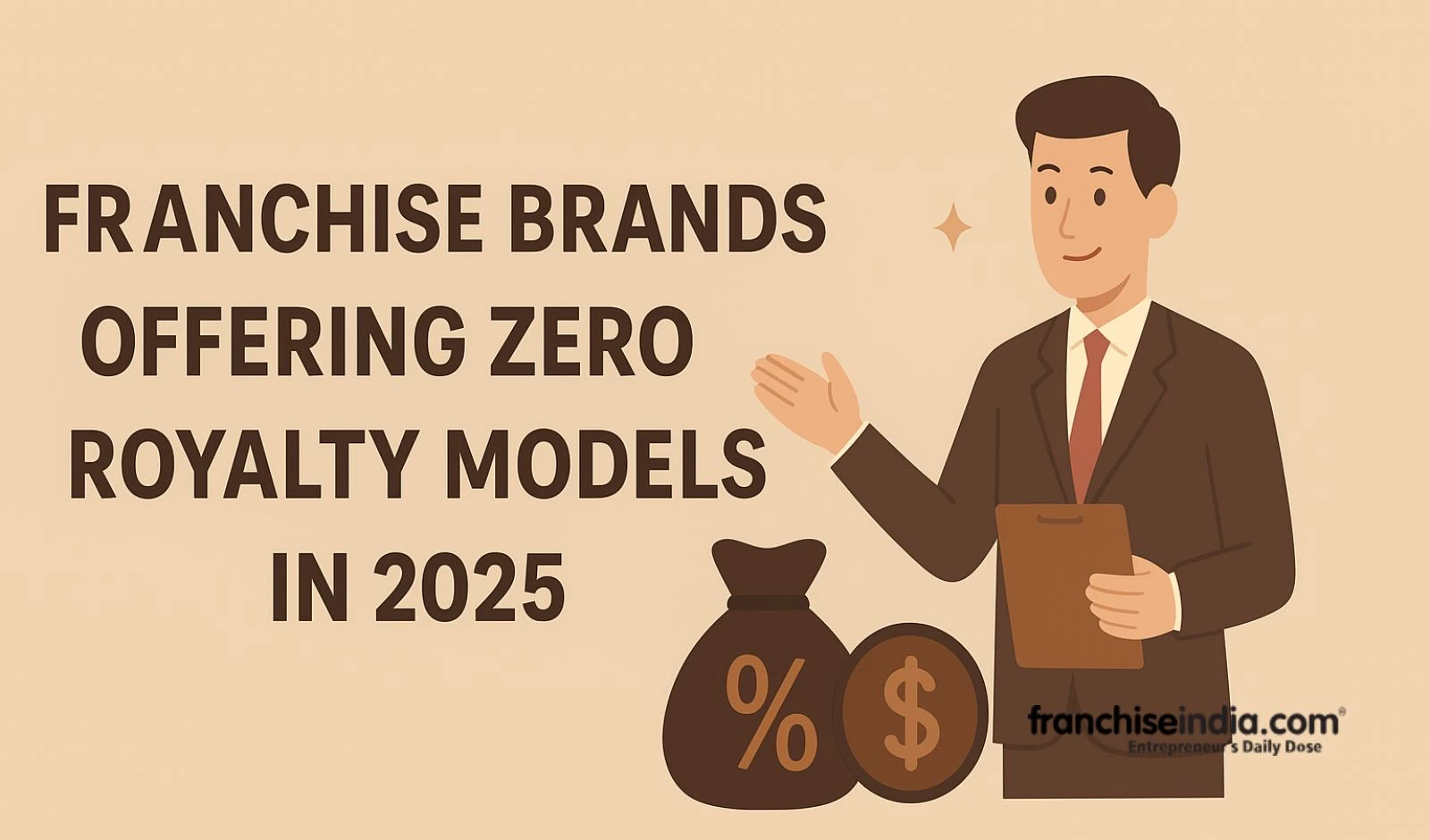
For years, franchising has been seen as a shortcut to business success, plug into a known brand, follow a proven system, and you’re off to a running start. But beneath that promise lies a recurring cost that many entrepreneurs quietly struggle dealing with i.e. Royalty fees.
These monthly payments to the parent company, often a slice of your revenue, can feel like a toll booth on your growth. In 2025, however, a new wave of franchise models is challenging that system. A growing number of brands are offering zero royalty structures, giving business owners more freedom, more profit, and more control.
Under this model, franchisees can use a brand name without paying periodic royalty fees. They pay a one-time franchise fee and get to keep all their monthly profits in return. For most entrepreneurs, particularly first-time business owners, this is a welcome respite.
In this blog, we'll take a look at the emergence of zero royalty franchises, their advantages, and the leading brands providing this model in 2025.
What Is a Zero Royalty Franchise?
A zero royalty franchise is a model where the franchisee pays only an initial fee to utilize the name, systems, and support but not monthly profits or royalty fees. This is opposed to conventional franchises, where a percentage of monthly revenue is paid to the franchisor.
The zero royalty model is popular in areas like education, health, and food because it gives business owners more freedom. They don’t have to pay monthly fees to the main company, so they can use their earnings to improve their business, hire staff, advertise, and grow faster.
Best Franchise Brands Providing Zero Royalty Models in 2025
Let us discuss some of the brightest zero royalty franchise brands in various industries.
1. Makoons Preschool
Industry: Education
Investment: ₹10–15 lakhs
Space Needed: 1,500–2,000 sq. ft.
Makoons Preschool is the leading zero royalty franchise provider. With more than 100 centers in 18 states, it presents a low-risk, high-return opportunity for entrepreneurs who are enthusiastic about early childhood education. The franchisee pays an initial fee and enjoys total access to Makoons' curriculum, brand, training, and operations support.
2. Brainy Stars International Montessori
Sector: Education
Investment: ₹8–12 lakhs
Space Required: 1,200–2,000 sq. ft.
Brainy Stars provides a Montessori-based curriculum with emphasis on all-around development. Their zero royalty model involves training, branding, and curriculum support. Flexible operations and good community interaction are offered for franchisees.
3. Wellness Lounge
Sector: Health & Wellness
Investment: ₹15–20 lakhs
Space Required: 800–1,500 sq. ft.
Wellness Lounge is a rapidly growing brand selling IV therapy, detoxification treatments, and wellness coaching. Its zero royalty model enables franchisees to concentrate on customer experience and service innovation without having to worry about profit sharing.
4. Chai Calling
Industry: Food & Beverage
Investment: ₹5–10 lakhs
Space Required: 300–600 sq. ft.
Chai Calling is a successful tea café brand providing a zero royalty model for small-format stores. Branded, menu, and supply chain assistance is given to franchisees, but full pricing and profit control remains with them.
5. FitBuddy Gym

Industry: Fitness
Investment: ₹20–30 lakhs
Space Needed: 2,000–3,000 sq. ft.
FitBuddy Gym has a zero royalty concept for fitnesspreneurs. With growing awareness of health, this brand offers equipment procurement, trainer training, and promotion assistance—without any deductions each month.
6. EduKart Learning Centers
Industry: After-School Education
Investment: ₹8–12 lakhs
Space Required: 1,000–1,500 sq. ft.
EduKart offers study support and skill development courses to students. Their royalty-free model offers access to curriculum, teacher training, and digital learning solutions.
7. Green Bowl Cafe
Industry: Healthy Food
Investment: ₹10–15 lakhs
Area Needed: 600–1,000 sq. ft.
Green Bowl Café sells salads, smoothies, and organic food. The zero royalty scheme sustains entrepreneurs who wish to advance healthy eating while not sacrificing profits.
How to Begin a Zero Royalty Franchise in 2025
Beginning a royalty-free franchise is easier than you believe. Here's a basic step-by-step procedure:
Step 1: Research and Compare
Search for brands with good reputations, successful stories, and open pricing. Think about industries that interest you and in-demand areas within your locality.
Step 2: Budget Planning
Estimate your overall investment, which includes franchise fee, rent, licenses, employees' salaries, and advertising. The majority of zero royalty franchises provide transparent breakdowns of costs.
Step 3: Apply and Interview
Fill out your documentation and visit a discovery session with the brand team. They will evaluate your location, objectives, and preparedness.
Step 4: Training and Setup
Brands usually provide 2–4 weeks of training in operations, customer service, marketing, and compliance. They also assist in interior design, equipment procurement, and hiring staff.
Step 5: Launch and Promote
Organize an opening function, place local advertising, and leverage social media to drive customers. Most brands help with launch campaigns and regular promotions.
Future Outlook
As more startups grow in India, many people are looking for business models that are simple and flexible. The zero royalty franchise model, where owners don’t have to pay monthly fees to the brand, is becoming very popular. It’s now a common choice for both new and experienced business owners.
Key Trends to Watch:
- Expansion in Tier 2 and Tier 3 Cities
Due to increasing disposable incomes and higher aspirations in tier II and tier III cities, royalty-free franchises will definitely grow aggressively outside metros. These areas have lesser setup costs and untapped customer bases.
- Diversification Across Sectors
Whereas education and food services are the current favorites, look forward to zero royalty models from the space of fitness, beauty, pet care, and even tech-enabled sectors like co-working and mobile repair.
- Performance-Based Partnerships
Rather than fixed royalties, some brands will use hybrid models where support comes from performance measurements to ensure mutual expansion without monthly deprivation.
- Investor Interest
As the model demonstrates profitability and scalability, additional investors and venture-backed brands can enter the space with structured support for zero royalty options.
Conclusion
Zero royalty franchise is more than a fad—it's a movement towards financial empowerment and operational autonomy. In 2025, as the trend continues to gain ground, entrepreneurs have an opportunity to create viable businesses without paying monthly royalties.
No matter your passion for education, wellness, cuisine, or fitness, there's a royalty-free franchise that aligns with your objective. Underpinning brand strength, freedom in operations, and keeping all the profits, you can dedicate yourself to what really counts: business growth and positive impact.
FAQ
1. Do zero royalty franchises still offer brand training and support?
Yes. Most zero royalty franchises provide initial training, branding materials, and operational guidance. The absence of monthly fees doesn’t mean reduced support—it simply shifts the cost structure to a one-time investment.
2. How do zero royalty franchises maintain brand consistency across locations?
They typically enforce brand standards through manuals, audits, and periodic check-ins. Even without royalty payments, franchisees are expected to follow brand guidelines to protect reputation and customer experience.

